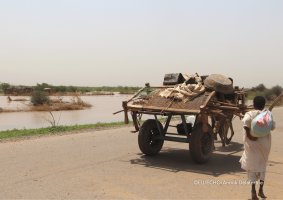All eyes on Sudan: Thousands of civilians trapped amid escalating violence in Al Fashir

The humanitarian situation in Al Fashir, North Darfur, has reached a catastrophic stage. After months of siege, the capital of North Darfur has fallen to the Rapid Support Forces (RSF), triggering widespread violence including ethnic and gender-based violence, and indiscriminate attacks. Thousands of civilians are trapped without food, water or medicine. Hospitals, neighborhoods and displacement sites continue to face bombardments and looting, while humanitarian access remains severely restricted.
Escalating crisis
For more than 16 months, Al Fashir has been under siege by the Rapid Support Forces (RSF). The city’s supply routes are blocked, communications are cut, and basic services have collapsed. ReliefWeb and satellite assessments confirm large-scale displacement, destruction of civilian infrastructure and acute shortages of essential goods.
Hunger and health emergencies
The numbers are staggering - over 260,000 civilians, including 130,000 children, remain under siege, with soaring malnutrition and no safe access to healthcare (UNICEF). Hospitals have been hit or forced to close, and aid deliveries are blocked by insecurity and bureaucratic barriers. Humanitarian organisations warn that Al Fashir risks sliding into famine if access does not improve immediately. The EU has issues a Joint statement by High Representative Kallas and Commissioner Lahbib on the seizure of El Fasher calling on all parties to immediately de-escalate in accordance with UN Security Council Resolution 2736.
Safe, rapid, and unimpeded humanitarian access must be allowed immediately.
VOICE calls for urgent international action
VOICE urges all parties to the conflict to:
- protect civilians and essential infrastructure;
- allow free movement of humanitarian action and people;
- ensure the safety of humanitarian workers including local responders.
VOICE calls on the EU and Member States to sustain diplomatic pressure to uphold international humanitarian law and ensure humanitarian access.
Member articles and reactions:
- CARE – IPC report on starvation in Sudan: Famine persists amidst ongoing atrocities in El Fasher, 4 November 2025
- CARE France – [Communiqué] Soudan : El Fasher, symbole d’une crise humanitaire volontairement ignorée, 5 November 2025
- Action Against Hunger – New IPC Analysis Identifies Famine in El Fasher and Kadugli and Critical Risk in 20 other Areas, 3 November 2025
- International Rescue Committee - IRC warns civilians trapped in or fleeing El Fasher risk being killed as arrivals in Tawila remain alarmingly low, 29 October 2025
- INTERSOS – Statement on attacks and humanitarian needs in El Fashir, 29 October 2025
- Norwegian Refugee Council – Jan Egeland: “All eyes must be on Al Fashir, Sudan”, 28 October 2025
- Danish Refugee Council – Statement by Secretary-General Charlotte Slente, 27 October 2025
- Mercy Corps Netherlands & partners – Joint statement on escalating violence, 27 October 2025
- Plan International UK – #KeepEyesOnSudan post, 27 October 2025
- International Rescue Committee - IRC warns of rapidly deteriorating conditions for people fleeing El Fasher as needs escalate in Tawila, 27 October 2025

